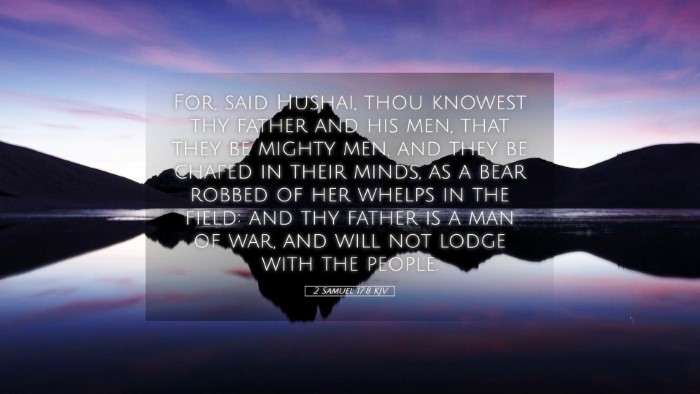Commentary on 2 Samuel 17:8
Verse: 2 Samuel 17:8 - "For, said Ahithophel, you know your father and his men, that they are mighty men, and they are chafed in their minds, as a bear robbed of her whelps in the field: and your father is a man of war, and will not lodge with the people." (KJV)
Contextual Overview
This verse occurs in a critical juncture of the narrative in 2 Samuel, where political intrigue and personal conflict converge. Ahithophel, a former counselor to King David, now lends his wisdom to Absalom in his attempt to usurp the throne. Understanding the nature of David’s warriors and the emotional state of David himself is essential for strategizing Absalom's ascension.
Insights from Commentaries
Matthew Henry's Commentary
Henry emphasizes that Ahithophel's astute observations reveal a deep understanding of the psychological state of the king and his loyal men. He describes the emotional turmoil among David's forces, likening them to a bear robbed of her cubs, which conveys a powerful image of their violence and determination. Henry draws attention to the fact that Ahithophel recognizes David not merely as a king but as a seasoned warrior who is not accustomed to defeat. This insight points to potential peril for Absalom if he underestimates David's capabilities.
Albert Barnes' Notes on the Bible
Barnes comments on the term "mighty men" to assert that these were not only physically formidable but also emotionally invested, having fought alongside David through many trials. He notes the strategic implications of their loyalty and the potential for their anger to lead to fierce retaliation against Absalom. Barnes highlights how Ahithophel's interpretation of David's men as "chafed" indicates that they are not mere soldiers but a family united by shared adversity, and such unity affords them greater strength in battle.
Adam Clarke's Commentary
Clarke offers a linguistic observation on the term "chafed," suggesting it denotes more than general anger; it implies provoked wrath, akin to a mother bear ready to defend her young. This metaphor serves to underline the ferocity that David’s men can muster when provoked, presenting a dire warning for Absalom’s plans. Clarke further discusses the character of David as a "man of war," emphasizing his experience and tactical skill. Clarke interprets this as a reminder that regardless of numbers or strategy, the heart of leadership and preparation lies in understanding the opponent's strengths and motivations.
Application for Today's Context
This verse and its commentary invite reflection on the nature of leadership, conflict, and emotional intelligence in the life of a believer. The insights gained from Ahithophel’s counsel remind pastors and theologians of the importance of understanding those whom they lead and the emotional undercurrents that can change the course of events.
- Emotional Awareness: In ministry and leadership, awareness of emotional dynamics within a community can dictate the effectiveness of guidance and decisions.
- Understanding Strengths: Recognizing the inherent strengths of one's congregation or team can help frame strategic initiatives that thrive on those qualities.
- Historical Context: The recollection of past struggles and victories can fortify faith and commitment within a community, much like David's men were driven by their history with him.
Theological Reflection
The theological implications of this verse resonate deeply with the concepts of loyalty, human emotion, and divine providence. The intense loyalty of David’s men draws parallels to the loyalty expected of believers toward God and His anointed leadership. This account challenges today's leaders to embody the qualities of righteous leadership, recognizing the weight of emotional and spiritual influence on the community.
Concluding Thoughts
2 Samuel 17:8, while historical in context, speaks volumes into the pastoral world today. The ability to navigate interpersonal dynamics, recognize the emotional states of those we lead, and apply strategic wisdom derived from understanding human nature is essential for effective ministry. Leaders are urged to be vigilant, as true leadership extends beyond authority into the realms of empathy, strategy, and spiritual fortitude.


